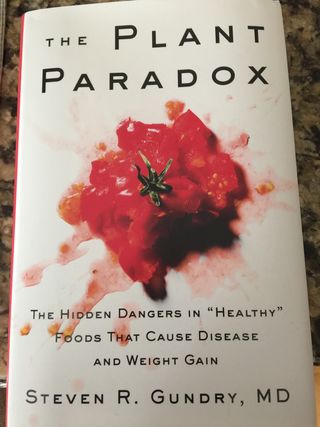Health
The Plant Paradox: Are All Vegetables Good for Us?
Some surprising vegetables and foods might be bad for your gut.
Posted June 17, 2017
A friend of mine handed me a copy of the new book, The Plant Paradox: The Hidden Dangers in “Healthy” Foods that Cause Disease and Weight Gain by Steven Gundry, MD. The title piqued my curiosity, and when I began reading, I could not put the book down.

Gundry, a cardiologist and surgeon, writes about another major toxin — a long side gluten called lectin that seems to be causing many inflammatory and digestive problems. Lectins are large plant-based proteins found in the “seeds, grains, skins, rinds and leaves of most plants that bind to carbohydrates (sugars).”(p. 14). Lectins are designed by nature to help the plant survive by protecting the plant from predators. Animals don’t like the taste, so they spit the seeds or rinds out. Humans aren’t quite as wise and continue to try to digest the lectins. Once inside, the lectins cause a chemical reaction playing havoc on our digestive system. Most people gain weight when consuming lectins, but some people cannot metabolize the lectins and lose weight.
Gundry is in private practice assisting people with all kinds of mental and physical health concerns. In his book he describes the many people who changed their lives by eliminating lectins. The book is filled with impressive case studies, and Gundry discusses cases from arthritis to migraines to cancers plus many more.
I will list several of many foods on the NO list from each of Gundry’s categories of lectin-containing foods.
Refined, Starchy Foods
- Agave Nectar
- Diet Drinks
- Pasta
Vegetables
- All lentils
- Legumes, including cashews
- Hummus
Fruits (some we call vegetables)
- All fruit, including berries unless they are in season
- Cucumbers
- Night shade vegetables such as tomatoes, peppers and melons
Non-Southern European Cow’s Milk Products
- Cheese
- Greek Yogurt
- Cottage Cheese
Grain-or Soybean Fed Fish, Shellfish, Poultry, Beef Lamb and Pork
All contain lectins based on their feeding processes.
Sprouted Grains and Grasses
- Quinoa
- Brown Rice
- Whole Grains
Oils
- Grape Seed
- Canola
- Corn
After reading all of this, I turned to my husband and said, “Well, we can drink water!” However, Gundry’s book does offer methods of getting rid of the lectins, such as using pressure cookers or something as simple as peeling the rinds off of fruits and vegetables or de-seeding the vegetables. He recommends eating fruit like candy — not often. If you love fruit, be sure to only eat fruit that is seasonal and ripe. Ripe fruit contain less lectins.
I also appreciated this book as it has a detoxification plan and many incredible recipes. I tried my first Green Smoothie made from romaine lettuce, spinach, one mint sprig, avocado, lemon juice, a bit of Stevia and crushed ice. My family refused to even try it, but it was refreshing and tasty! I knew my body was going to appreciate it.
If you are experiencing some difficult health problems, The Plant Paradox might just be the solution you are seeking.
Yours in brain health,
Lori
Be sure to also check out the Online Counseling Program at Bradley University for more useful resources!
References
Gundry, S. R. (2017). The Plant Paradox: The Hidden Dangers in "Healthy" Foods that Cause Disease and Weight
Gain. New York, New York: Harper Wave.


